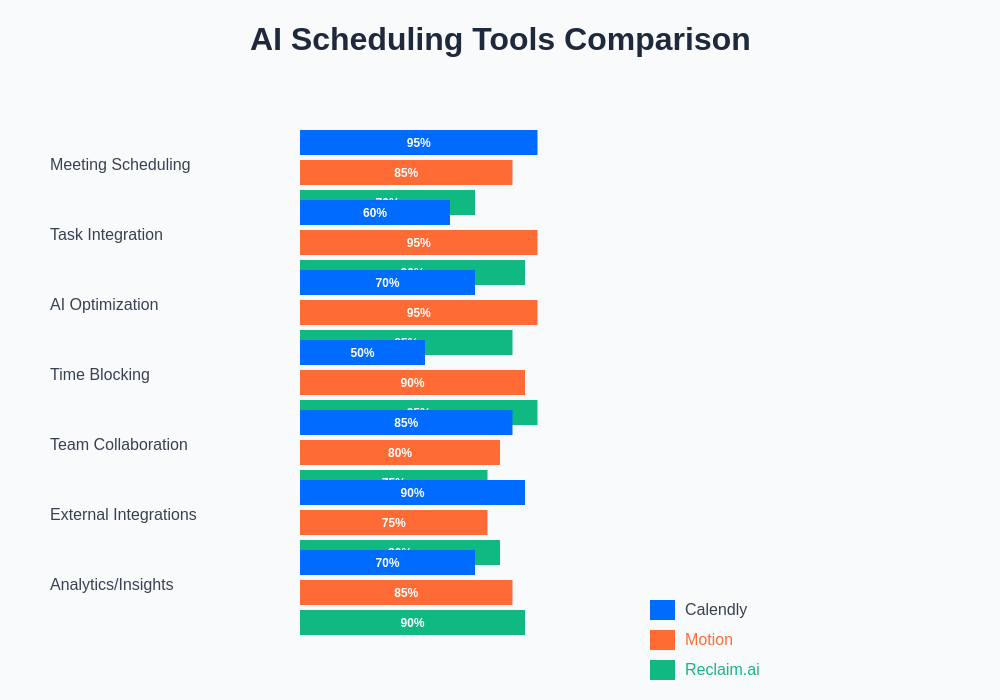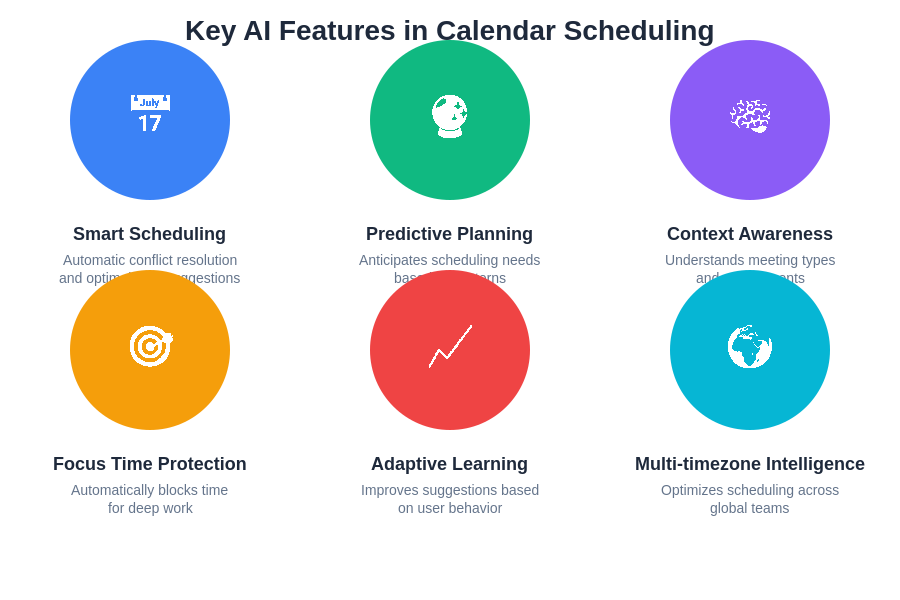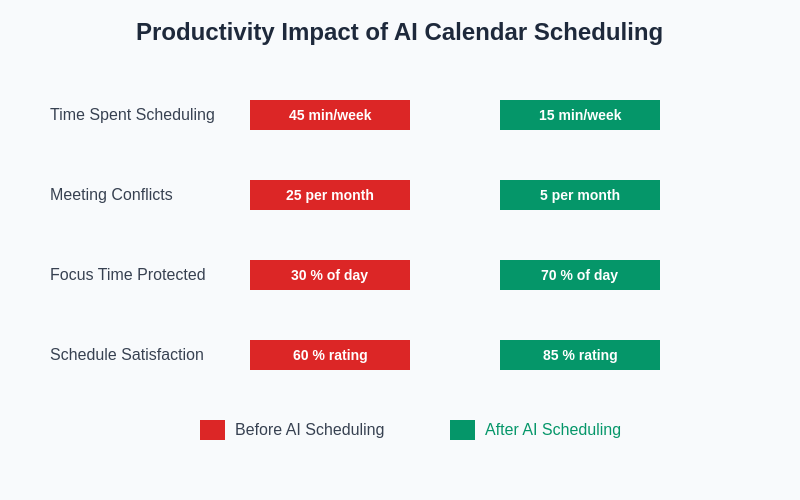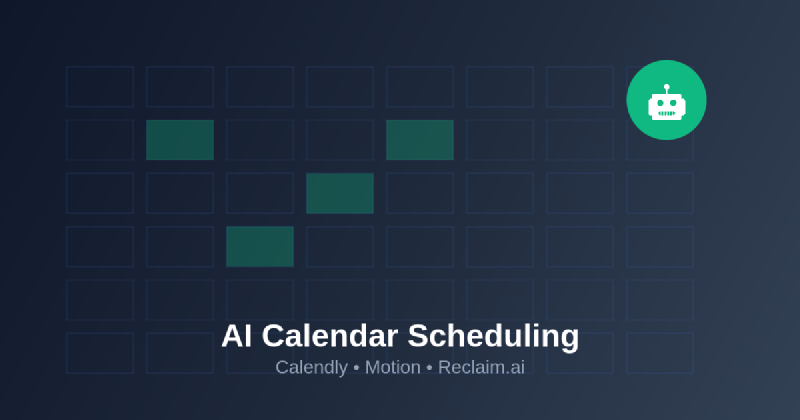The evolution of calendar management has reached a revolutionary milestone with the integration of artificial intelligence into scheduling platforms, transforming how professionals, teams, and organizations approach time management and meeting coordination. Modern AI-powered calendar scheduling tools have moved far beyond simple appointment booking to become sophisticated systems capable of understanding context, optimizing schedules, and making intelligent decisions about time allocation based on user preferences, priorities, and behavioral patterns.
Explore the latest AI productivity trends to discover how intelligent scheduling is reshaping workplace efficiency and personal time management. The emergence of platforms like Calendly, Motion, and Reclaim.ai represents a fundamental shift from reactive scheduling to proactive time optimization, where artificial intelligence actively works to maximize productivity and minimize scheduling conflicts before they occur.
The Foundation of AI-Powered Scheduling
Traditional calendar management required constant manual intervention, resulting in scheduling conflicts, inefficient time allocation, and the perpetual struggle to balance competing priorities. AI-powered scheduling platforms have revolutionized this landscape by introducing intelligent algorithms that learn from user behavior, understand contextual priorities, and automatically optimize schedules to maximize productivity while maintaining work-life balance. These sophisticated systems analyze patterns in meeting frequency, duration preferences, energy levels throughout the day, and project deadlines to create scheduling recommendations that align with both immediate needs and long-term objectives.
The transformation extends beyond simple automation to encompass predictive scheduling capabilities that anticipate future needs based on historical data and current project trajectories. Modern AI scheduling tools can identify optimal meeting times across multiple time zones, suggest buffer periods for preparation and follow-up activities, and even recommend schedule adjustments to prevent burnout and maintain peak performance levels throughout extended work periods.
Calendly: Pioneering Intelligent Meeting Coordination
Calendly has established itself as a cornerstone of modern scheduling infrastructure, evolving from a simple appointment booking platform to a comprehensive AI-enhanced meeting coordination system. The platform’s intelligent scheduling engine analyzes availability patterns, meeting preferences, and time zone complexities to streamline the entire process of coordinating meetings with internal team members and external stakeholders. Calendly’s AI capabilities extend to understanding meeting context through integration with calendar entries, email communications, and project management systems, enabling the platform to make increasingly sophisticated scheduling decisions.
The platform’s strength lies in its ability to eliminate the traditional back-and-forth communication typically associated with meeting scheduling while maintaining the human element of personalized interaction. Calendly’s AI algorithms consider factors such as preferred meeting times, preparation requirements, travel time between appointments, and even energy levels at different times of day to suggest optimal scheduling options. The system’s learning capabilities improve over time, adapting to changing preferences and evolving work patterns to provide increasingly accurate and helpful scheduling recommendations.
Enhance your productivity with Claude’s AI capabilities for advanced scheduling analysis and optimization strategies that complement your chosen calendar management platform. The integration of multiple AI tools creates a comprehensive productivity ecosystem that addresses every aspect of time management and meeting coordination.
Motion: Revolutionary AI-Driven Schedule Optimization
Motion represents a paradigm shift in calendar management by introducing comprehensive AI-driven schedule optimization that goes far beyond traditional appointment booking. The platform’s sophisticated artificial intelligence engine treats scheduling as a complex optimization problem, considering multiple variables including task priorities, project deadlines, energy levels, meeting requirements, and personal preferences to create dynamically optimized daily schedules that adapt in real-time to changing circumstances and new priorities.
The revolutionary aspect of Motion lies in its ability to seamlessly integrate task management with calendar scheduling, creating a unified system where artificial intelligence continuously balances scheduled meetings with focused work time, project deadlines, and personal commitments. Motion’s AI algorithms analyze productivity patterns, identify optimal work periods for different types of activities, and automatically reschedule tasks and meetings when conflicts arise or priorities shift. This intelligent approach to schedule management ensures that important work receives appropriate time allocation while maintaining flexibility to accommodate unexpected opportunities and urgent requirements.
Motion’s predictive capabilities extend to anticipating potential scheduling conflicts before they occur, suggesting proactive adjustments that prevent last-minute scrambling and maintain schedule integrity. The platform’s AI learns from user behavior patterns, project completion rates, and meeting effectiveness to provide increasingly accurate time estimates and scheduling recommendations that align with actual work patterns rather than idealistic time projections.
Reclaim.ai: Intelligent Time Block Management
Reclaim.ai has pioneered the concept of intelligent time block management, utilizing artificial intelligence to automatically protect and optimize focused work time while ensuring that meetings and collaborative activities receive appropriate scheduling priority. The platform’s AI engine analyzes calendar patterns, project requirements, and productivity metrics to create dynamic time blocks that adapt to changing priorities while maintaining consistent progress on important objectives and long-term goals.
The sophistication of Reclaim.ai’s approach lies in its ability to understand the relationship between different types of work activities and optimize schedule allocation accordingly. The platform’s AI recognizes that certain tasks require uninterrupted focus periods, while others benefit from collaborative interaction, and automatically adjusts time block allocation to maximize effectiveness for each category of work. Reclaim.ai’s intelligent scheduling algorithms consider factors such as energy levels throughout the day, meeting preparation requirements, and project deadlines to create schedules that support both immediate productivity and long-term project success.
Reclaim.ai’s unique strength is its ability to maintain work-life balance through intelligent boundary management, ensuring that personal time receives appropriate protection while accommodating the natural fluctuations in work demands that characterize modern professional environments. The platform’s AI continuously monitors schedule density and automatically suggests adjustments to prevent overcommitment and maintain sustainable work practices that support long-term productivity and personal well-being.
Comparative Analysis: Features and Capabilities
The landscape of AI-powered scheduling tools presents distinct approaches to solving the complex challenge of optimal time management, with each platform offering unique strengths that cater to different user needs and organizational requirements. Calendly excels in external meeting coordination and client-facing scheduling scenarios, providing sophisticated tools for managing complex availability patterns across multiple team members while maintaining professional presentation and seamless user experience for external participants.
Motion’s comprehensive approach to schedule optimization makes it particularly valuable for individuals and teams who require integrated task and meeting management with intelligent priority balancing. The platform’s ability to dynamically adjust schedules based on changing priorities and real-time circumstances provides exceptional flexibility for fast-paced work environments where adaptability is crucial for maintaining productivity and meeting critical deadlines.
Reclaim.ai’s focus on intelligent time block management and work-life balance optimization makes it ideally suited for knowledge workers who require extended periods of focused work time while maintaining collaborative availability for team coordination and stakeholder communication. The platform’s sophisticated understanding of different work activity types and their scheduling requirements provides exceptional value for complex project management scenarios.

The comparative analysis reveals distinct strengths across different AI scheduling platforms, with each tool excelling in specific areas that align with particular user needs and organizational requirements. Understanding these capability differences is crucial for selecting the optimal scheduling solution for specific productivity objectives and workflow patterns.
Discover comprehensive AI research capabilities with Perplexity to enhance your understanding of productivity optimization and time management strategies that complement AI-powered scheduling tools. The combination of intelligent research and automated scheduling creates a powerful framework for continuous productivity improvement and strategic time allocation.
Integration Ecosystem and Workflow Enhancement
The effectiveness of AI-powered scheduling platforms is significantly enhanced through their integration capabilities with existing productivity tools, communication systems, and project management platforms. Modern scheduling AI systems understand that calendar management exists within a broader ecosystem of workplace tools, and their ability to seamlessly connect with email systems, project management platforms, video conferencing tools, and document collaboration systems determines their practical impact on overall productivity and workflow efficiency.
Calendly’s extensive integration ecosystem enables sophisticated workflow automation that extends far beyond simple meeting scheduling to encompass comprehensive customer relationship management, sales pipeline optimization, and team coordination workflows. The platform’s ability to trigger automated follow-up sequences, update project management systems, and synchronize with customer databases creates streamlined processes that eliminate manual data entry and reduce the likelihood of scheduling-related errors or oversights.
Motion’s integration approach focuses on creating a unified productivity environment where scheduling decisions are informed by comprehensive project data, task dependencies, and team collaboration requirements. The platform’s ability to connect with project management tools, communication platforms, and document systems enables AI-driven scheduling decisions that consider the full context of work requirements rather than treating calendar scheduling as an isolated activity.
Reclaim.ai’s integration philosophy emphasizes the connection between time management and overall work effectiveness, with sophisticated connections to productivity tracking tools, goal management systems, and performance analytics platforms. This comprehensive approach enables the platform’s AI to make scheduling decisions that optimize not just immediate time allocation but long-term productivity trends and professional development objectives.
Advanced AI Features and Machine Learning Capabilities
The sophistication of modern AI scheduling platforms is demonstrated through their advanced machine learning capabilities that continuously improve scheduling accuracy and effectiveness based on user behavior patterns, meeting outcomes, and productivity metrics. These systems employ complex algorithms that analyze vast amounts of scheduling data to identify patterns and preferences that may not be immediately apparent to users, enabling increasingly intelligent automation that adapts to evolving work styles and changing priorities.
Calendly’s machine learning algorithms analyze meeting success rates, participant satisfaction, and scheduling efficiency to provide recommendations that improve overall meeting effectiveness while reducing scheduling overhead. The platform’s AI learns from patterns in meeting cancellations, reschedules, and participant feedback to suggest optimal meeting durations, timing, and frequency that maximize engagement and minimize disruption to productive work flow.
Motion’s advanced AI capabilities extend to predictive modeling that anticipates future scheduling needs based on project trajectories, seasonal work patterns, and team collaboration requirements. The platform’s machine learning systems analyze task completion rates, meeting productivity, and schedule adherence to provide increasingly accurate time estimates and scheduling recommendations that align with actual work patterns rather than optimistic projections.
Reclaim.ai’s sophisticated AI algorithms focus on understanding the relationship between schedule structure and work output, analyzing productivity metrics across different time block configurations to identify optimal scheduling patterns for various types of work activities. The platform’s machine learning capabilities enable it to predict when schedule adjustments will be necessary and proactively suggest changes that maintain productivity while accommodating unexpected priorities or opportunities.
Privacy, Security, and Data Management
The integration of artificial intelligence into calendar scheduling requires sophisticated approaches to privacy protection and data security, as these platforms necessarily access sensitive information about work patterns, meeting participants, project priorities, and personal scheduling preferences. Modern AI scheduling platforms implement comprehensive security frameworks that protect user data while enabling the intelligent analysis required for effective schedule optimization and productivity enhancement.
Calendly’s approach to data security emphasizes encryption of all scheduling data, secure transmission protocols, and comprehensive access controls that ensure sensitive scheduling information remains protected while enabling necessary AI analysis for schedule optimization. The platform’s privacy framework allows users to maintain control over data sharing while benefiting from intelligent scheduling recommendations based on aggregated usage patterns and best practices derived from successful scheduling implementations.
Motion’s security architecture recognizes the sensitive nature of integrated task and calendar data, implementing advanced encryption and access control mechanisms that protect project information, task priorities, and scheduling preferences while enabling AI-driven optimization. The platform’s approach to privacy balances the need for comprehensive data analysis with user control over information sharing and the ability to maintain confidentiality for sensitive projects and strategic initiatives.
Reclaim.ai’s privacy framework focuses on protecting the detailed work pattern data required for intelligent time block optimization while ensuring that personal scheduling information and productivity metrics remain secure and under user control. The platform’s approach to data management enables sophisticated AI analysis while maintaining clear boundaries between different types of information and providing users with granular control over data sharing and analysis parameters.
Implementation Strategies and Best Practices
Successfully implementing AI-powered scheduling platforms requires strategic planning that considers existing workflow patterns, team collaboration requirements, and organizational culture factors that influence adoption and effectiveness. The most successful implementations involve gradual integration that allows users to adapt to AI-driven scheduling while maintaining familiar processes during the transition period.
Calendly implementation strategies typically focus on establishing clear scheduling protocols that leverage the platform’s AI capabilities while maintaining consistency across team members and departments. Successful implementations involve comprehensive training on the platform’s intelligent features, establishment of scheduling standards that optimize AI effectiveness, and integration planning that connects Calendly with existing productivity tools and communication systems.
Motion implementation requires careful consideration of task management integration and schedule optimization preferences, as the platform’s comprehensive approach to AI-driven productivity affects multiple aspects of work organization beyond simple meeting scheduling. Successful Motion implementations involve detailed analysis of existing productivity workflows, strategic planning for task and calendar integration, and gradual adoption that allows users to adapt to the platform’s intelligent scheduling recommendations.
Reclaim.ai implementation strategies emphasize the importance of understanding individual and team work patterns before enabling intelligent time block management, as the platform’s effectiveness depends on accurate configuration of work priorities, focus time requirements, and collaboration availability. Successful implementations involve detailed analysis of productivity patterns, careful configuration of AI parameters, and ongoing optimization based on schedule effectiveness metrics and user feedback.
Future Developments and Industry Trends
The evolution of AI-powered scheduling continues to accelerate, with emerging technologies promising even more sophisticated approaches to time management and productivity optimization. Future developments in artificial intelligence, machine learning, and predictive analytics are expected to enable scheduling platforms that can anticipate needs, optimize resources, and adapt to changing circumstances with unprecedented sophistication and accuracy.
The integration of advanced natural language processing capabilities is expected to enable more intuitive interaction with AI scheduling systems, allowing users to communicate scheduling preferences and requirements through conversational interfaces that understand context and nuance. These developments will make AI-powered scheduling more accessible to users who prefer natural communication over complex configuration interfaces.

The evolution of AI scheduling capabilities continues to expand across multiple dimensions, with each advancement contributing to more sophisticated and user-friendly time management solutions. These technological improvements promise to make intelligent scheduling increasingly accessible and effective for diverse user needs and organizational contexts.

The measurable benefits of implementing AI-powered calendar scheduling demonstrate substantial improvements across key productivity metrics, with organizations reporting significant reductions in scheduling overhead and corresponding increases in protected focus time and overall schedule satisfaction.
Predictive analytics advancements are anticipated to enable scheduling platforms that can forecast future productivity patterns, identify optimal work arrangements, and suggest schedule modifications that prevent burnout while maximizing long-term effectiveness. These capabilities will transform AI scheduling from reactive optimization to proactive productivity enhancement that supports sustainable work practices and career development objectives.
The continued advancement of AI-powered scheduling platforms represents a fundamental shift toward intelligent time management that supports both immediate productivity needs and long-term professional success through sophisticated understanding of work patterns, collaboration requirements, and personal preferences that enable truly personalized productivity optimization.
Disclaimer
This article is for informational purposes only and does not constitute professional advice. The views expressed are based on current understanding of AI scheduling technologies and their applications in productivity management. Readers should conduct their own research and consider their specific requirements when selecting and implementing AI-powered scheduling tools. The effectiveness of different platforms may vary depending on individual needs, team requirements, and organizational contexts.
